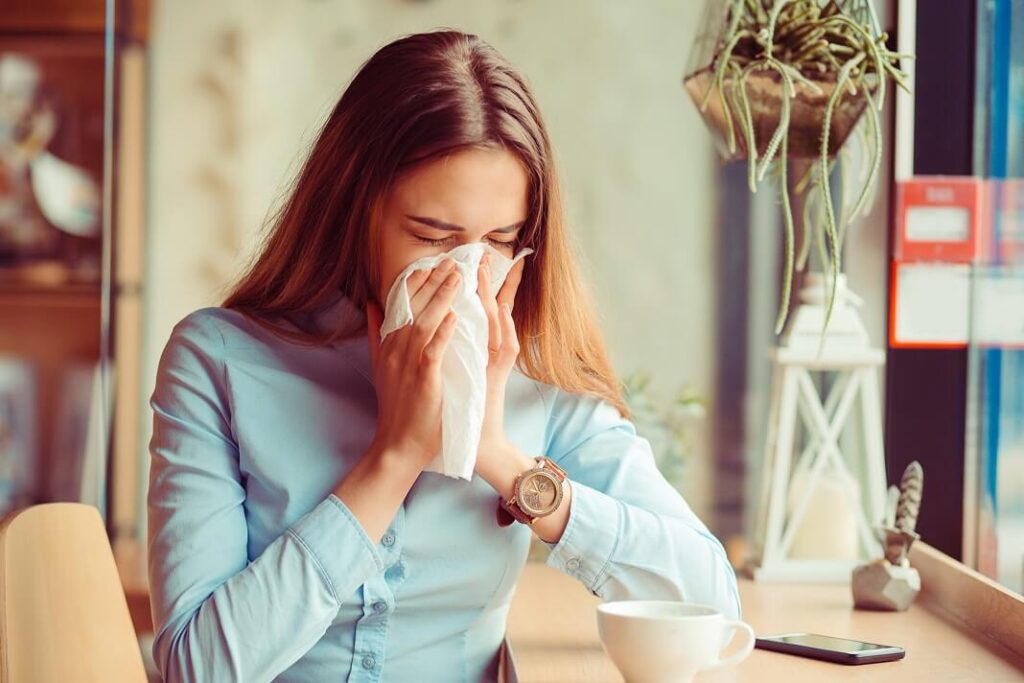Allergies are the most common ailments, lasting a lifetime and occurring at frequent intervals. For a better understanding, one can say that allergies are the hypersensitive responses from the immune system to substances either entering the body or encountering the body. Any substance that has the ability to cause an allergic reaction is known as an allergen. Allergens are easily found in food, drinks or in the environment.
It is not necessary to have an instant reaction to allergies. Before reacting, the immune system builds up sensitivity towards the substance gradually. Butterbur is safe and effective in treating allergic symptoms.
- Is It Safe
- Why Butterbur
- Side Effects
Table of Contents
Did You Know?
- The most common allergens are pollen, dust, and nuts. They cause sneezing, peeling of the skin and vomiting. In extreme cases, it may cause difficulty in breathing also.
- The most-reported fatal food allergic reactions are triggered by food, consumed outside.
- More than 15% of school-going children suffer from allergies.
How Does Butterbur Work?
As soon as the body meets the allergen, the body releases the inflammatory chemical leukotriene. This inflammatory chemical leukotriene is responsible for treating allergic reaction. Leukotriene (LT)(1) inhibitors block and prevent or relieve an individual of the allergic reactions. Butterbur acts as the LT receptor inhibitor and prevents any further reactions.
Regular consumption of Butterbur helps in relieving of the allergic reactions in an individual. It is advisable to use Butterbur oral supplements for at least two weeks to see the supplement work and get positive results. People use the bulb, leaf and the root to make the medicine. Butterbur products, which are labeled and certified as “PA-free”, should only be used.
The chemicals in Butterbur relieve spasms and decrease swelling (inflammation).
Is Butterbur Safe to Use?
Butterbur is safe to use, as there is no evidence of butterbur having any major, moderate or minor reaction to any known drug. However, to be on the safe side, it is advisable to consult the doctor in case of any ongoing medications for any other symptoms. You are adviced against self-diagnosing and self-treating yourself.
- Butterbur may also be used in treating migraines, stomach ulcers, hay fever, whooping cough, insomnia, ongoing cough, plague, chills, anxiety, and other headaches. Some people also apply butterbur to their wounds in order to increase the healing process faster.
Why is Butterbur for Allergies Considered Effective?
Butterbur is a plant extract which finds its use in alternative medicine. The extract is taken from the leaves, roots or bulb of the plant. Butterbur(2) is known to have many impressive health benefits. The health benefits of butterbur include
- Anti-inflammatory properties: One of the most immediate effects that butterbur has on your bodies is reducing the inflammations. Allergies cause rashes. Butterbur immediately heals the inflammations at the onset of allergies. Inflammation is one of the most dangerous things in our bodies, especially if it is chronic in nature as it tends to wear down the body gradually.
- Common cold: During seasonal change, every individual is affected by the common cold and allergies. Sneezing and coughing are common with a person affected by allergies. Butterbur can stimulate the expulsion of mucus and phlegm from the respiratory tracts and the nasal cavities. The bacteria find the mucus and the phlegm the perfect hot spots to lodge themselves into and cultivate. So, eliminating these hot spots by preventing progression of the allergies can relieve one from continuously sneezing and coughing.
- The antihistamine in nature: A person who is allergic might encounter difficulty in standing even for a few minutes. These physical symptoms are due to the release of histamine. Since butterbur is antihistamine in nature, it can naturally prevent allergic reactions or even help in reducing the severity of a similar reaction.
Butterbur Side Effects
Butterbur is an herbal supplement known to help in treating the common allergic reactions. The common Butterbur Side effects are:
- Asthma
- Headache
- Burping
- Itchy eyes
- Drowsiness
- Fatigue
- Upset stomach
- Diarrhea
The best way to avoid allergies is to avoid the allergens that cause the overreaction. Though it may sound easy, it may not be as easy. For example, it is always not possible to avoid going outdoors. In cases as such, one with dust allergy should wear a mask and keep medicine handy for worst-case scenarios. Keeping an anti-allergy action plan is important to avoid deterioration of the condition.
Any individual may be affected by an allergic reaction no matter how cautious the person is. It is therefore wise to have the allergen test and detect what are the allergens that cause allergic reactions and have a plan of action ready to treat the condition. Keeping an allergic plan of action ready is beneficial since you could be susceptible to varied allergic reactions.
Butterbur for allergies is an important option or rather an important natural remedy because of the healing properties that it has. However, ensure that use butterbur for allergies only consulting a doctor or a medical professional.
